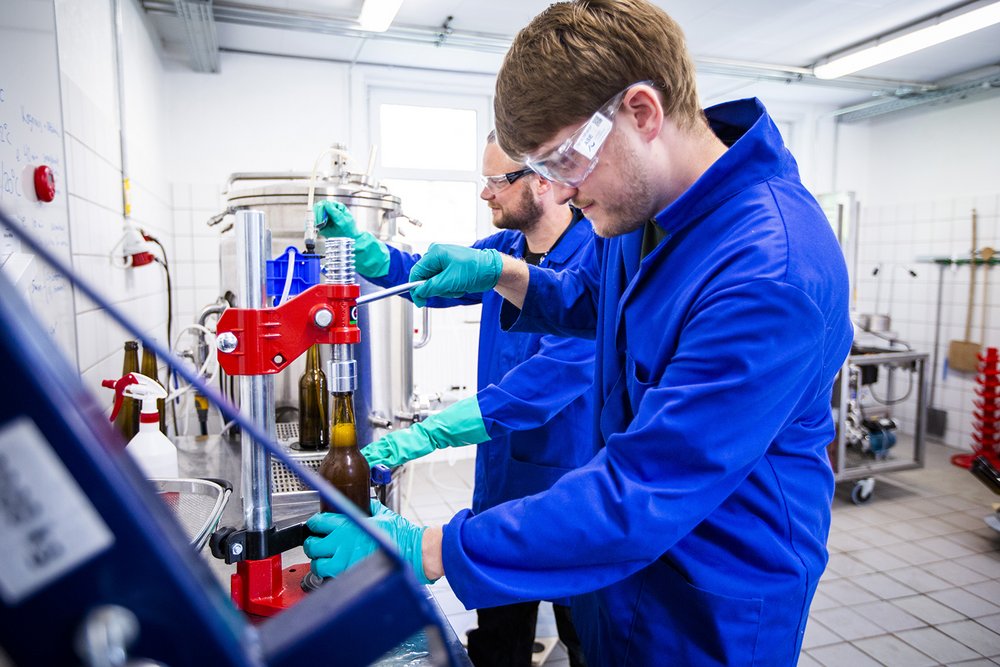Now you can have a gin & tonic made of waste
In collaboration with engineers at Aarhus University, the small Aarhus distillery Njord has created innovative beverages using the company's residual products: "It's a fantastic way of creating high-value products out of something that would’ve otherwise just been discarded."

In a small, modest room in one of Aarhus University's (AU) buildings on Hangøvej, just north of the city’s inner ring road, two gentlemen are in the process of cleaning half-litre bottles and filling them with an intricate beverage from one of the three 150-litre fermentation tanks lining the tiled walls.
‘AU Brewery’ is written above the door. This is where engineering students and researchers usually experiment with new fermentation processes and enzyme reactions, but at the moment the brewery is being visited by Jens Niklasson from the Njord distillery. In collaboration with engineer Jesper Westergaard Kristensen from the Department of Biological and Chemical Engineering, Jens Niklasson is finalising the production of two new types of sustainable, low-alcohol beverages that were created using the residual products from Njord’s gin production.
"After we’ve distilled gin, we are left with a cloudy tea-like liquid that consists of water, a little bit of alcohol, and juniper berries, herbs and flowers. A very bitter, not particularly aromatic, herbal tea that we’d normally just throw out," says Jens Niklasson as he caps a bottle. "After we noticed the amount of water, herbs and raw materials that were being dumped into the sewer, we thought it’d be a good idea to use these residual products instead."
In collaboration with i.a. Aarhus University, Njord created the project 'Sustainable Ginventions' with funding from Future Food Innovation, FFBI, and the innovation network for environmental technology, Inno-MT.
The purpose of the project was to examine residual water and flavours fractions, and to try and find out how to optimally recycle both parts and use them in new products. And to show that it is actually possible and worthwhile to work with sustainable circular production, even when it comes to products designed for complex and exciting taste experiences.
The distillery already had experience in the field, as it has been producing a gin on the residues from a tonic syrup for several years. But this project centered on the residual products from gin production.
"In the beginning, we just wanted to try to create a tonic for our many different types of gin. It seemed like a natural thing to do. We didn’t have our own laboratory facilities or the necessary chemical knowledge to experiment with these things, so we started a collaboration with Aarhus University. And in the process, we’ve developed two new beverages from the gin water: A tonic and an orange-coloured cocktail with a wealth of complex flavours. We look forward to putting them both into full-scale production," says Jens.
(The article continues below the picture)

"We’re invariably looking into a future where we have to rethink production chains, waste streams and residual products, and where a circular mindset is mandatory," says engineer Jesper Westergaard Kristensen (in the back), who participates in the development project with i.a. Jens Niklasson (in front) from Njord. Photo: Lise Balsby.
Prior to the pilot production, several tests were completed by researchers and students at the university in collaboration with Njord, where they tested a wide range of fermentation processes, fermentation types, sensory tests, etc.
Engineer Jesper Westergaard Kristensen runs the many facilities in the processing hall on a daily basis, and along with Njord he’s today figuring out how to scale up the process to an industrial scale. He hopes that the project will inspire other companies to consider the benefits of knowing their waste streams and experimenting with them:
“Many small food companies lack equipment, knowledge and competencies when it comes to their innovation processes. As a university, we can use the laboratory to lead the way, so that a company has a proof of concept to use as a starting point when it invests in equipment for industrial production," says Jesper Westergaard Kristensen and continues:
"We’re invariably looking into a future where we have to rethink production chains, waste streams and residual products, and where a circular mindset is mandatory. Waste is a huge problem for modern food production, which is why this is a fantastic way of creating high-value products out of something that would’ve otherwise just been discarded. A textbook example of how we can use and refine things that would otherwise be poured into the sewer. We're actually quite good at this in Denmark, and the need for this will only increase as we move into the future.”
After the pilot production of the two low-alcohol soda drinks, Njord will move production to its own premises located on the port of Aarhus.
Contact
Jesper Bruun
Science journalist
Mail: Bruun@au.dk
Tel.: +45 42404140
